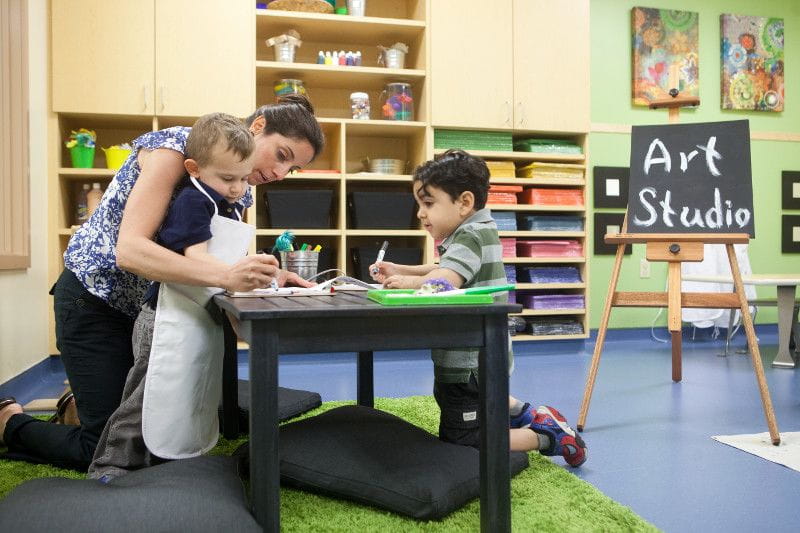When I was a single working parent with a young child, I felt most productive and engaged at work when I knew my daughter was safe, well cared for, and reaching important milestones in her child care program. My colleagues felt similarly about their own children. When we felt good about child care, we were productive. When we were worried about our children's experiences, on the other hand, our productivity was diminished.
Most companies can't afford drops in productivity every time parents have concerns about their family's child care program. So to avoid them, companies should be asking not merely how to provide child care ; but also what leads to confidence in a program.
This starts with program quality - lessons rooted in strong educational principles, and teachers who are supported with the resources they need to effectively provide those lessons. At Bright Horizons, we're constantly working to make sure we deliver on those directives.
In the important area of STEM (Science, Technology, Engineering, and Math), for example, we recently developed a series of activities and put them on laminated cards for the classroom. These cards were designed to spur teachers to expand STEM lessons into customized activities and projects specific to the group of children they're teaching. Responses to the STEM cards have been so positive that more are being developed.
New curriculum for social-and-emotional development was also added. The curriculum included a teacher guide with specifics about how to nurture these important skills, everything from how to develop infant-caregiver trust, to how to help pre-kindergarten children with critical social skills (joining a group of children who are already playing together or asking for help with a problem, for example). For teachers, principles for positively guiding children's behavior were also provided. These principles, called Caring Matters, are being made available to teachers in a traditional document as well as a new digital book mode.
Bright Horizons recently surveyed parents and teachers of over 1000 graduates - now kindergartners and first graders who've settled into their new schools. The results:
When parents are confident that their child care program is high quality - that their child's teachers are well-supported and have the resources that they need - they're better able to focus on their work.
Confidence and performance.
The two go hand-in-hand.
Most companies can't afford drops in productivity every time parents have concerns about their family's child care program. So to avoid them, companies should be asking not merely how to provide child care ; but also what leads to confidence in a program.
Focus on Learning
Of course high standards for health and safety are essential. But in addition to knowing their children are safe, a focus on learning is also key. Because for parents to feel complete confidence about a program they need to know their children are progressing in developmentally appropriate ways.This starts with program quality - lessons rooted in strong educational principles, and teachers who are supported with the resources they need to effectively provide those lessons. At Bright Horizons, we're constantly working to make sure we deliver on those directives.
In the important area of STEM (Science, Technology, Engineering, and Math), for example, we recently developed a series of activities and put them on laminated cards for the classroom. These cards were designed to spur teachers to expand STEM lessons into customized activities and projects specific to the group of children they're teaching. Responses to the STEM cards have been so positive that more are being developed.
New curriculum for social-and-emotional development was also added. The curriculum included a teacher guide with specifics about how to nurture these important skills, everything from how to develop infant-caregiver trust, to how to help pre-kindergarten children with critical social skills (joining a group of children who are already playing together or asking for help with a problem, for example). For teachers, principles for positively guiding children's behavior were also provided. These principles, called Caring Matters, are being made available to teachers in a traditional document as well as a new digital book mode.
Positive Results Equals Confidence
Of course, results speak volumes.Bright Horizons recently surveyed parents and teachers of over 1000 graduates - now kindergartners and first graders who've settled into their new schools. The results:
Parents
- 98% believed Bright Horizons graduates entered elementary school with a strong enthusiasm for learning, an ability to make new friends, and an ability to respect others.
- 97% said their children were prepared and ready to meet the demands of kindergarten or first grade.
Teachers
- 92% agreed or strongly agreed that Bright Horizons graduates entered elementary school with a strong enthusiasm for learning, an ability to make new friends, and the ability to respect others.
- 94% called graduates ready to accept new responsibilities and greater independence.
- 95% believed graduates met or exceeded their expectations for readiness for kindergarten and first grade.
- These figures instill confidence in parents, and that confidence translates to performance.
Child Care Benefits? Confidence and Performance
So the bottom line is that child care alone is not enough. The quality of the program is key.When parents are confident that their child care program is high quality - that their child's teachers are well-supported and have the resources that they need - they're better able to focus on their work.
Confidence and performance.
The two go hand-in-hand.





